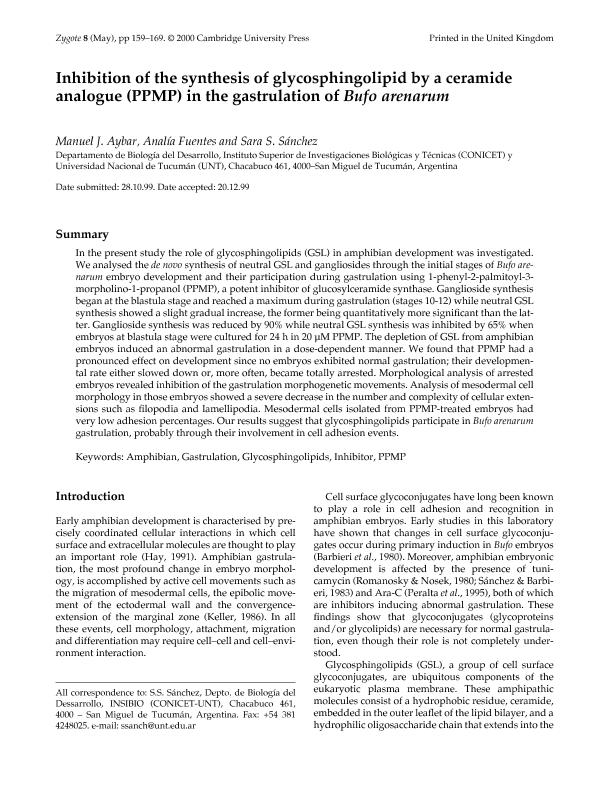Artículo
Inhibition of the synthesis of glycosphingolipid by a ceramide analogue (PPMP) in the gastrulation of Bufo arenarum
Fecha de publicación:
05/2000
Editorial:
Cambridge University Press
Revista:
Zygote
ISSN:
0967-1994
Idioma:
Inglés
Tipo de recurso:
Artículo publicado
Clasificación temática:
Resumen
In the present study the role of glycosphingolipids (GSL) in amphibian development was investigated. We analysed the de novo synthesis of neutral GSL and gangliosides through the initial stages of Bufo arenarnm embryo development and their participation during gastrulation using 1-phenyl-2-palmitoyl-3-morpholino-1-propanol (PPMP), a potent inhibitor of glucosylceramide synthase. Ganglioside synthesis began at the blastula stage and reached a maximum during gastrulation (stages 10-12) while neutral GSL synthesis showed a slight gradual increase, the former being quantitatively more significant than the lat-ter. Ganglioside synthesis was reduced by 90% while neutral GSL synthesis was inhibited by 65% when embryos at blastula stage were cultured for 24 h in 20 μM PPMP. The depletion of GSL from amphibian embryos induced an abnormal gastrulation in a dose-dependent manner. We found that PPMP had a pronounced effect on development since no embryos exhibited normal gastrulation; their developmental rate either slowed down or, more often, became totally arrested. Morphological analysis of arrested embryos revealed inhibition of the gastrulation morphogenetic movements. Analysis of mesodermal cell morphology in those embryos showed a severe decrease in the number and complexity of cellular extensions such as filopodia and lamellipodia. Mesodermal cells isolated from PPMP-treated embryos had very low adhesion percentages. Our results suggest that glycosphingolipids participate in Bufo arenarum gastrulation, probably through their involvement in cell adhesion events.
Palabras clave:
AMPHIBIAN
,
GASTRULATION
,
GLYCOSPHINGOLIPIDS
,
INHIBITOR
,
PPMP
Archivos asociados
Licencia
Identificadores
Colecciones
Articulos(INSIBIO)
Articulos de INST.SUP.DE INVEST.BIOLOGICAS
Articulos de INST.SUP.DE INVEST.BIOLOGICAS
Citación
Aybar, Manuel Javier; Fuentes, Cynthia Analia; Sanchez, Sara Serafina del V.; Inhibition of the synthesis of glycosphingolipid by a ceramide analogue (PPMP) in the gastrulation of Bufo arenarum; Cambridge University Press; Zygote; 8; 2; 5-2000; 159-169
Compartir
Altmétricas




